The Guardian wrote:The James Webb space telescope has detected what appear to be six massive ancient galaxies, which astronomers are calling “universe breakers” because their existence could upend current theories of cosmology.
www.skyandtelescope.org copy pastes.
Moderator: Community Team
Forum rules
Please read the Community Guidelines before posting.
Please read the Community Guidelines before posting.
- Maxleod
- Posts: 586
- Joined: Wed Nov 04, 2015 7:08 am
- Location: DARDIS (Drunkness And Relative Dimensions In Sleep)
Re: Astronomy
https://www.theguardian.com/science/202 ... t-galaxies
- jusplay4fun
- Posts: 8356
- Joined: Sun Jun 16, 2013 8:21 pm
- Gender: Male
- Location: Virginia
Re: Astronomy
These 3 heavenly bodies were very clear tonight, with few clouds. I was the moon, Jupiter, and Venus, almost in a vertical line (see diagram below).
Yesterday it was too cloudy to see more than the moon, once in while. I missed looking Feb. 21.
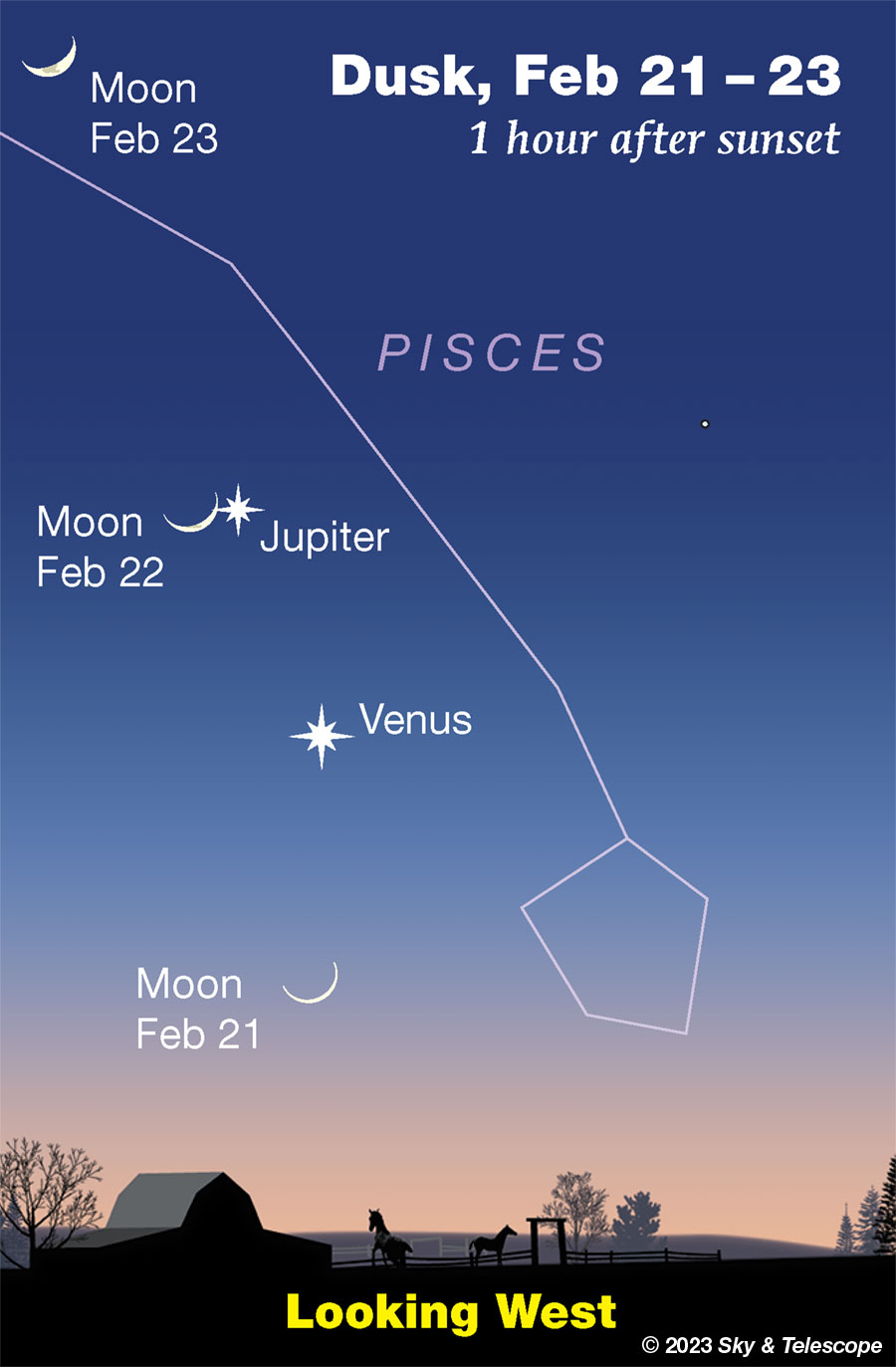
https://skyandtelescope.org/astronomy-n ... ary-17-26/
Yesterday it was too cloudy to see more than the moon, once in while. I missed looking Feb. 21.

https://skyandtelescope.org/astronomy-n ... ary-17-26/
■ Jupiter and Venus are closing in on each other in the western evening twilight,
They're on their way to an eye-grabbing conjunction on March 1st. That evening they'll be ½° apart and lined up horizontally (seen from the mid-latitudes of North America). Mark your calendar!
Jupiter and Venus are closing on each other in the western twilight. The two brightest planets are quite eye-catching in the dusk. Watch them draw closer together day by day.
THIS WEEK'S PLANET ROUNDUP
Mercury is hidden deep in the sunrise.
Venus and Jupiter, the two brightest planets, shine boldly in the west-southwest at dusk. Venus is the lower and brighter one; they're magnitudes –3.9 and –2.1, respectively.
They're drawing closer together every day. On Friday the 17th they're 12° apart and closing fast; a week later on the 24th they're only 5° apart. They're on their way to a close conjunction on March 1st, when they'll pass just half a degree apart.
Telescopically Venus is a shimmering little gibbous ball, 12 arcseconds in diameter and 87% sunlit. Jupiter is 34 arcseconds wide. That's small for Jupiter; it's nearly on the other side of the solar system from us. Jupiter displays a strikingly dimmer surface brightness in a telescope. That's because it's nearly 7 times farther from the illuminating Sun than Venus is.
Use binoculars to check in on the pinpoint moons of Jupiter, very close to its globe.
JP4Fun


- jusplay4fun
- Posts: 8356
- Joined: Sun Jun 16, 2013 8:21 pm
- Gender: Male
- Location: Virginia
Re: Astronomy
Venus and Jupiter have "flipped"
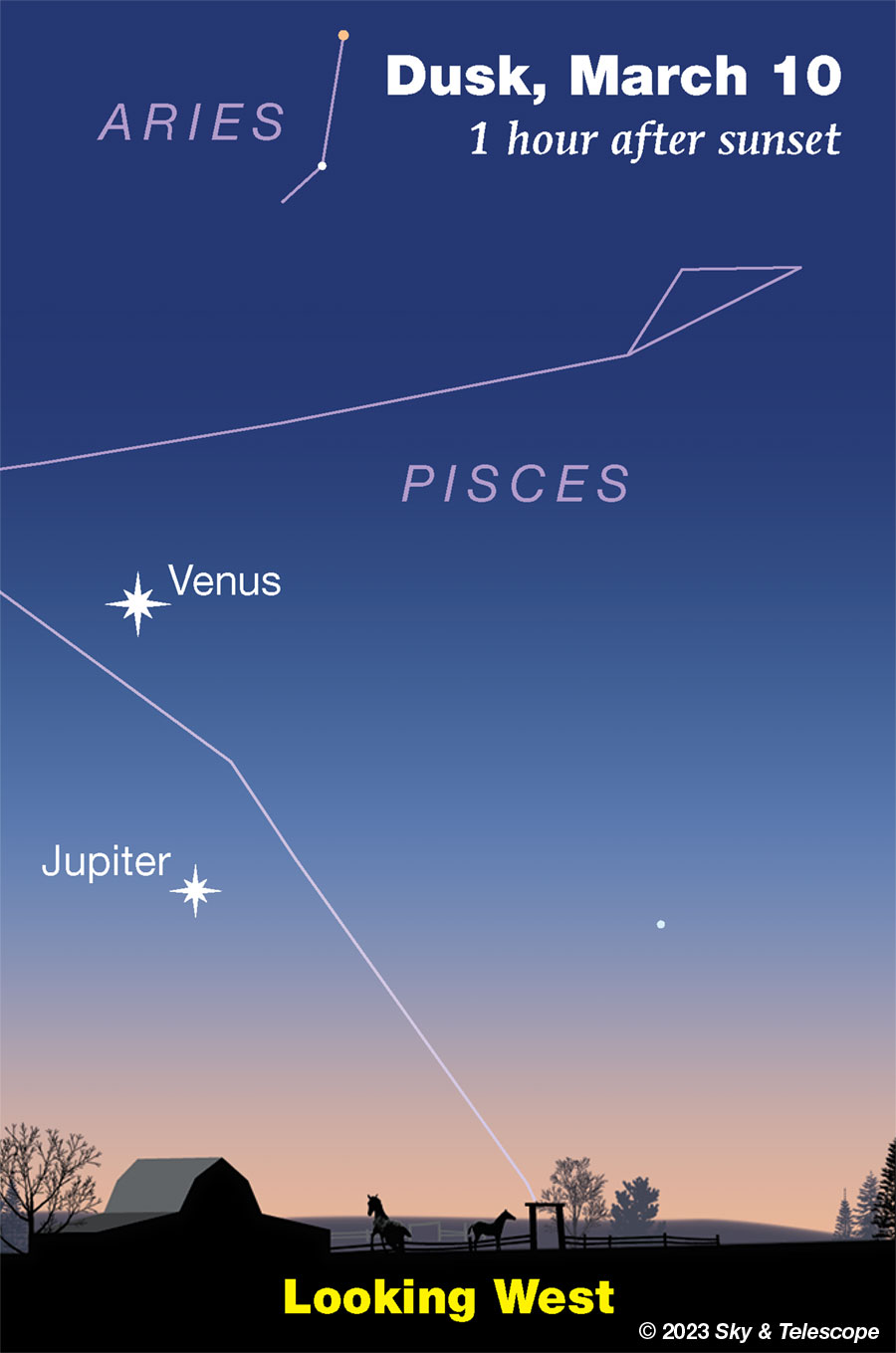
https://skyandtelescope.org/astronomy-n ... arch-3-12/
FRIDAY, MARCH 10
■ Venus and Jupiter continue to move farther apart in the western evening twilight. Tonight finds them 9° from each other, as shown below.

https://skyandtelescope.org/astronomy-n ... arch-3-12/
JP4Fun


- jimboston
- Posts: 5379
- Joined: Tue Sep 11, 2007 2:45 pm
- Gender: Male
- Location: Boston (Area), Massachusetts; U.S.A.
Re: Astronomy
We’re all gonna die!
https://www.dailymail.co.uk/sciencetech ... -2046.html
They say “very small chance” of impact… then they say 1 in 560?
In astronomical terms 1/560 is not “very small”.
People win the lottery every day with much much worse odds!
https://www.dailymail.co.uk/sciencetech ... -2046.html
They say “very small chance” of impact… then they say 1 in 560?
In astronomical terms 1/560 is not “very small”.
People win the lottery every day with much much worse odds!
- jusplay4fun
- Posts: 8356
- Joined: Sun Jun 16, 2013 8:21 pm
- Gender: Male
- Location: Virginia
Re: Astronomy
by jimboston on Thu Mar 09, 2023 7:46 am
The REAL questions are HOW and When?
CPL Obvious: Of course we will.We’re all gonna die!
The REAL questions are HOW and When?
JP4Fun


Re: Astronomy
Asteriod-deflecting missions have already been successfully tested.jimboston wrote:We’re all gonna die!
https://www.dailymail.co.uk/sciencetech ... -2046.html
They say “very small chance” of impact… then they say 1 in 560?
In astronomical terms 1/560 is not “very small”.
People win the lottery every day with much much worse odds!
We have 23 years to plan for this one. I predict success.
“Life is a shipwreck, but we must not forget to sing in the lifeboats.”
― Voltaire
― Voltaire
- jonesthecurl
- Posts: 4617
- Joined: Sun Mar 16, 2008 9:42 am
- Gender: Male
- Location: disused action figure warehouse
- Contact:
Re: Astronomy
Tunguska
- very bad science reporting. No it didn't.This 160-foot asteroid caused a nuclear explosion
instagram.com/garethjohnjoneswrites
- jusplay4fun
- Posts: 8356
- Joined: Sun Jun 16, 2013 8:21 pm
- Gender: Male
- Location: Virginia
Re: Astronomy
Whom are you quoting? Who said THAT, Jonesy?jonesthecurl wrote:Tunguska- very bad science reporting. No it didn't.This 160-foot asteroid caused a nuclear explosion
JP4Fun


- jonesthecurl
- Posts: 4617
- Joined: Sun Mar 16, 2008 9:42 am
- Gender: Male
- Location: disused action figure warehouse
- Contact:
Re: Astronomy
It's in the Mail article that was linked to.jusplay4fun wrote:Whom are you quoting? Who said THAT, Jonesy?jonesthecurl wrote:Tunguska- very bad science reporting. No it didn't.This 160-foot asteroid caused a nuclear explosion
instagram.com/garethjohnjoneswrites
- jusplay4fun
- Posts: 8356
- Joined: Sun Jun 16, 2013 8:21 pm
- Gender: Male
- Location: Virginia
Re: Astronomy
from that source:jonesthecurl wrote:It's in the Mail article that was linked to.jusplay4fun wrote:Whom are you quoting? Who said THAT, Jonesy?jonesthecurl wrote:Tunguska- very bad science reporting. No it didn't.This 160-foot asteroid caused a nuclear explosion
Yes, I agree; it was bad science reporting. The explosion itself was NOT "a nuclear explosion" but its effects were similar, without the radiation.The collision of the 165-foot 2023 DW with our planet would be comparable to the Tunguska 12-megaton event that slammed into Siberia 114 years ago.
This 160-foot asteroid caused a nuclear explosion that would have destroyed a large metropolitan area - but it landed in a forest, flattening more than 80 million trees.
JP4Fun


- jusplay4fun
- Posts: 8356
- Joined: Sun Jun 16, 2013 8:21 pm
- Gender: Male
- Location: Virginia
Re: Astronomy
https://skyandtelescope.org/astronomy-n ... rch-10-19/THIS WEEK'S SKY AT A GLANCE
THIS WEEK'S SKY AT A GLANCE, MARCH 10 – 19
BY: ALAN MACROBERT MARCH 10, 2023
and:Mercury is hidden deep in the glow of sunrise.
Venus and Jupiter shine in the west at dusk. Venus is the brightest at magnitude –3.9. Jupiter, at magnitude –2.1, is one fifth as bright. And as Jupiter gets lower, it's increasingly dimmed by atmospheric effects: atmospheric extinction, and apparent "dimming" by being seen on a brighter sky background.
The two planets get farther apart every day. On Friday March 10th they's separated by 9° as shown at the top of this page. By the 17th they widen to 15° apart.
Telescopically, Venus is a shimmering little gibbous ball 13 arcseconds in diameter and 83% sunlit. Jupiter is 34 or 33 arcseconds wide, about as small as we ever see it; Jupiter is nearly on the other side of the solar system from us now. Moreover, Jupiter is getting very blurry in a telescope as it sinks to an ever-lower altitude.
https://skyandtelescope.org/astronomy-b ... nsit-m100/
also:
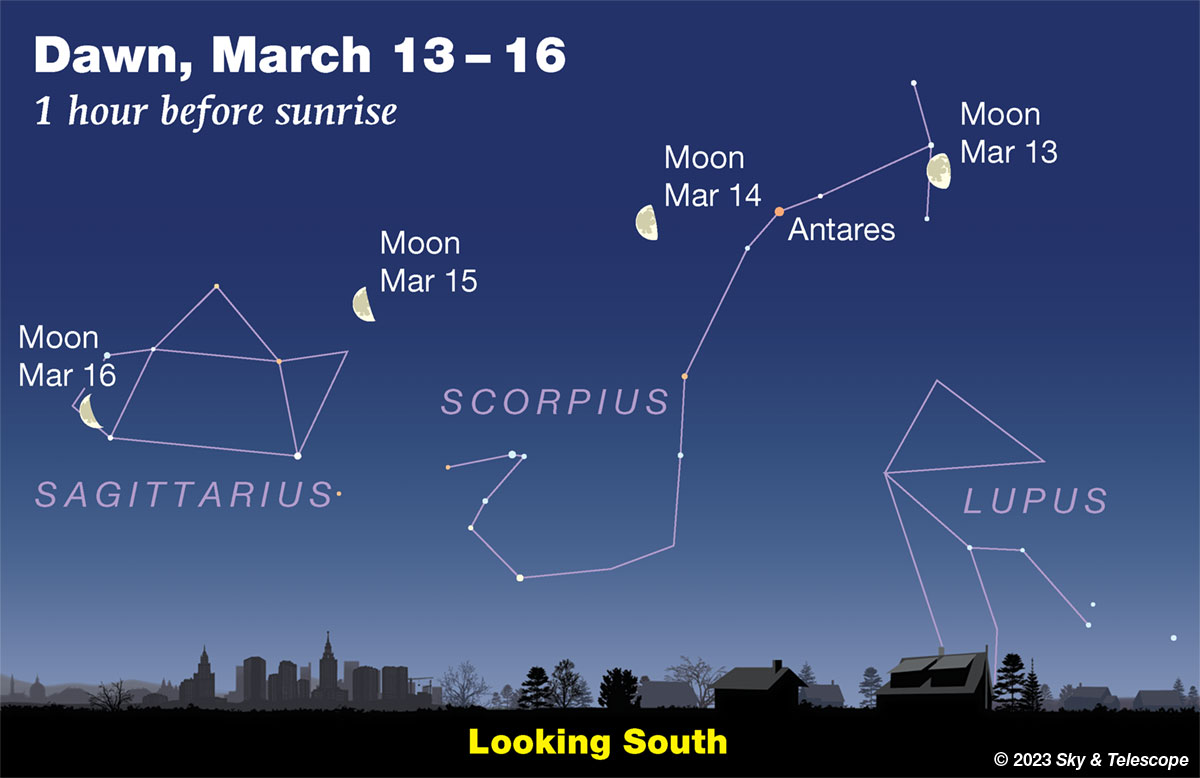
JP4Fun


- jusplay4fun
- Posts: 8356
- Joined: Sun Jun 16, 2013 8:21 pm
- Gender: Male
- Location: Virginia
Re: Astronomy
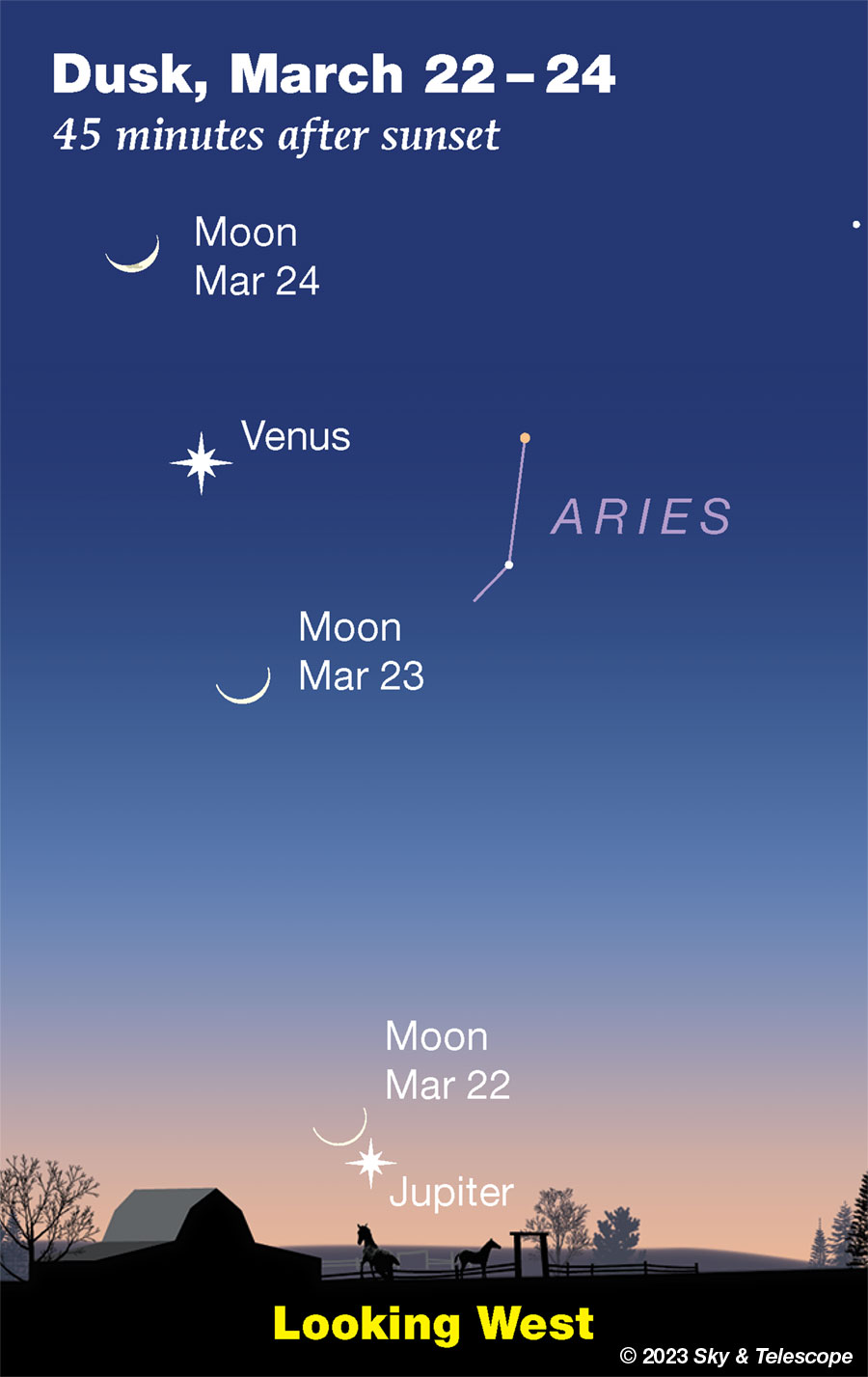
https://skyandtelescope.org/astronomy-n ... rch-17-26/THIS WEEK'S PLANET ROUNDUP
Mercury is hidden in the glow of sunset. But it's heading up for a good evening apparition in early April.
Venus (magnitude –4.0, in Aries) is the "Evening Star" shining brightly in the west during and after dusk. It finally sets about 2 hours after dark. Telescopically, Venus is a shimmering little gibbous ball 13 arcseconds in diameter and 82% sunlit.
Mars crosses from the horns of Taurus toward the feet of Gemini this week, moving east against the stars. Look for it high in the southwest in early evening, lower in the west later. It's upper left of Venus by about five fists at arm's length.
Mars continues to fade: from magnitude +0.7 to +0.8 this week. It's very similar to Mars-colored Aldebaran (+0.9) some 18° below it, and Mars-colored Betelgeuse (currently +0.4) about the same distance to Mars's lower left. They form a big, temporary Orange Triangle, equilateral or nearly so.
In a telescope Mars is now a little blob only 7 arcseconds wide, generally too small to show any detail visually. But notice its gibbous shape: 90% sunlit.
Jupiter is heading down deep into the afterglow of sunset. Look for it about two fists lower right of Venus. Binoculars may help, especially later in the week.
Saturn is deep in the dawn glow, very low in the east-southeast. Try binoculars about 40 minutes before sunrise.
JP4Fun


- jusplay4fun
- Posts: 8356
- Joined: Sun Jun 16, 2013 8:21 pm
- Gender: Male
- Location: Virginia
Re: Astronomy
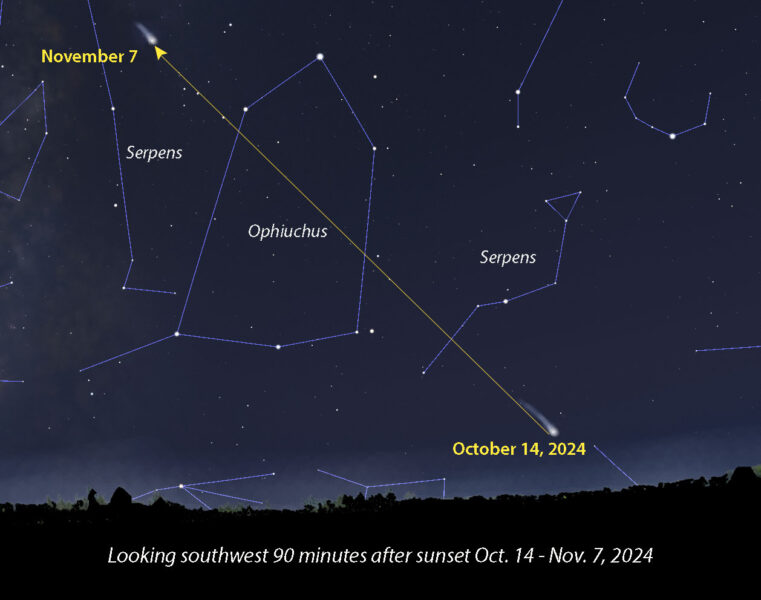
https://skyandtelescope.org/astronomy-n ... c-2023-a3/Newly discovered Comet C/2023 A3 might reach naked-eye brightness when it flies past Earth in 2024. Check out our forecast of what to expect to see in the months ahead.
JP4Fun


- jusplay4fun
- Posts: 8356
- Joined: Sun Jun 16, 2013 8:21 pm
- Gender: Male
- Location: Virginia
Re: Astronomy
https://www.msn.com/en-us/news/technolo ... 983a&ei=14Strange Acceleration of Mysterious Interstellar Visitor Finally Explained
Story by Michelle Starr • 11h ago
An interstellar object that is currently on its long journey back out of our Solar System has a completely natural explanation, in spite of its odd quirks.
The peculiar acceleration of 'Oumuamua, new research confirms, can be fully attributed to the release of molecular hydrogen gas.
This, according to astrochemist Jennifer Bergner of the University of California, Berkeley and astrophysicist Darryl Seligman of Cornell University, is further evidence that the cigar-shaped chunk of rock started off as a planet seed before being booted off to wander the galaxy untethered to a star.
JP4Fun


- jimboston
- Posts: 5379
- Joined: Tue Sep 11, 2007 2:45 pm
- Gender: Male
- Location: Boston (Area), Massachusetts; U.S.A.
Re: Astronomy
Another 5fer.
Everybody loves your thread!
Everybody loves your thread!
- jusplay4fun
- Posts: 8356
- Joined: Sun Jun 16, 2013 8:21 pm
- Gender: Male
- Location: Virginia
Re: Astronomy
Do you have anything intelligent and relevant to add here, jimb? 
And remember, astrology is not astronomy.
And remember, astrology is not astronomy.
JP4Fun


- jusplay4fun
- Posts: 8356
- Joined: Sun Jun 16, 2013 8:21 pm
- Gender: Male
- Location: Virginia
Re: Astronomy
As usual, at least HERE, NOTHING intelligent is offered by jimb.jusplay4fun wrote:Do you have anything intelligent and relevant to add here, jimb?
And remember, astrology is not astronomy.
Can jimb count higher than FIVE..??
JP4Fun


- jimboston
- Posts: 5379
- Joined: Tue Sep 11, 2007 2:45 pm
- Gender: Male
- Location: Boston (Area), Massachusetts; U.S.A.
Re: Astronomy
You waited a whole hour and 15 minutes. LOLjusplay4fun wrote:As usual, at least HERE, NOTHING intelligent is offered by jimb.jusplay4fun wrote:Do you have anything intelligent and relevant to add here, jimb?
And remember, astrology is not astronomy.

Can jimb count higher than FIVE..??
- jusplay4fun
- Posts: 8356
- Joined: Sun Jun 16, 2013 8:21 pm
- Gender: Male
- Location: Virginia
Re: Astronomy
waited? I logged in, checked Forums, and noticed ANOTHER stoooopid attempt at an insult from STOOOPID jimb.jimboston wrote:You waited a whole hour and 15 minutes. LOLjusplay4fun wrote:As usual, at least HERE, NOTHING intelligent is offered by jimb.jusplay4fun wrote:Do you have anything intelligent and relevant to add here, jimb?
And remember, astrology is not astronomy.

Can jimb count higher than FIVE..??
And jimb still contributes NOTHING intelligent.
IDIOT jimb strikes again.
This is how empty is the life of jimb. He counts:
1) my posts here, and
2) the time between posts.
Get a life, jimb. You keep proving what a sad little man you are. Nothing New here, AGAIN.
JP4Fun


- jusplay4fun
- Posts: 8356
- Joined: Sun Jun 16, 2013 8:21 pm
- Gender: Male
- Location: Virginia
Re: Astronomy
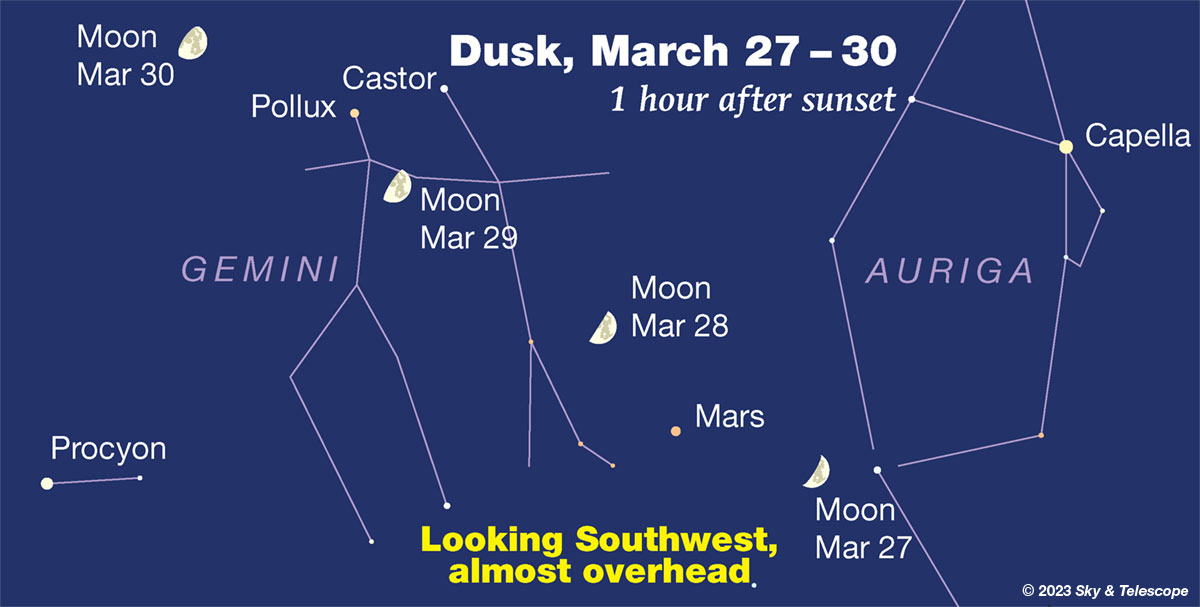
https://skyandtelescope.org/astronomy-n ... 4-april-2/TUESDAY, MARCH 28
■ First-quarter Moon (exactly so at 10:32 p.m. EDT). Darkness finds the Moon hanging about 6° above Mars, the top corner of the temporary Orange Triangle. The triangle's other two corners (out of the frame above) are Betelgeuse to Mars's lower left and Aldebaran farther under Mars.
WEDNESDAY, MARCH 29
■ Now the high waxing gibbous Moon shines under Castor and Pollux, as shown above.
JP4Fun


- Maxleod
- Posts: 586
- Joined: Wed Nov 04, 2015 7:08 am
- Location: DARDIS (Drunkness And Relative Dimensions In Sleep)
Re: Astronomy
I say it's BS. To cover it. "Interstellar objects" don't get to change their trajectory at will. Because, you know, The Laws of Physics, Newton, etc. Don't need a PhD in Physics like JP4 to know that, Newton equations are fairly easy to understand, with just a semi academic knowledge of Maths.jusplay4fun wrote:https://www.msn.com/en-us/news/technolo ... 983a&ei=14Strange Acceleration of Mysterious Interstellar Visitor Finally Explained
Story by Michelle Starr • 11h ago
An interstellar object that is currently on its long journey back out of our Solar System has a completely natural explanation, in spite of its odd quirks.
The peculiar acceleration of 'Oumuamua, new research confirms, can be fully attributed to the release of molecular hydrogen gas.
This, according to astrochemist Jennifer Bergner of the University of California, Berkeley and astrophysicist Darryl Seligman of Cornell University, is further evidence that the cigar-shaped chunk of rock started off as a planet seed before being booted off to wander the galaxy untethered to a star.
Re: Astronomy
The Oumuamua mystery has been solved.
https://www.ctvnews.ca/sci-tech/scienti ... -1.6328757
https://www.ctvnews.ca/sci-tech/scienti ... -1.6328757
From the moment scientists named 'Oumuamua – which roughly translates to "scout" in Hawaiian – the first interstellar object to enter the solar system, Earth has buzzed with speculation about its nature and origin.
The cigar-shaped oddity from outer space was detected passing through the solar system 2017 and is, by now, on its way to the Pegasus constellation.
'Oumuamua moved in a comet-like way but lacked the tail of vapour that would normally be seen trailing a comet. It was also small compared to comets, which can be several kilometres wide.
Its elongated shape and other unusual characteristics led to theories it was everything from a "cosmic dust bunny," to an alien probe, to a chunk of a distant planet.
Scientists now say they know what it is, and the answer is less sensational than some previous theories have suggested.
According to a study published in the scientific journal Nature on Wednesday, 'Oumuamua is most likely an interstellar comet.
Until 'Oumuamua, scientists had only ever observed comets that originated within the solar system and had similar characteristics. NASA describes these comets as "frozen leftovers from the formation of the solar system composed of dust, rock, and ices."
As solar system comets orbit the sun, solar radiation causes them to heat up and spew jets of vapourized dust and gas that are visible from Earth: their signature tails.
The authors of this latest study, Jennifer Bergner and Darryl Seligman, have figured out that 'Oumuamua probably does have a cometary tail. It's just invisible. Because 'Oumuamua is so much smaller than the comets scientists typically observe, Bergner and Seligman wrote that it could have generated a hydrogen gas jet that was just too small and thin to be detectible to telescopes.
“Life is a shipwreck, but we must not forget to sing in the lifeboats.”
― Voltaire
― Voltaire
- jusplay4fun
- Posts: 8356
- Joined: Sun Jun 16, 2013 8:21 pm
- Gender: Male
- Location: Virginia
Re: Astronomy
Who said that?Maxleod wrote:I say it's BS. To cover it. "Interstellar objects" don't get to change their trajectory at will. Because, you know, The Laws of Physics, Newton, etc. Don't need a PhD in Physics like JP4 to know that, Newton equations are fairly easy to understand, with just a semi academic knowledge of Maths.jusplay4fun wrote:https://www.msn.com/en-us/news/technolo ... 983a&ei=14Strange Acceleration of Mysterious Interstellar Visitor Finally Explained
Story by Michelle Starr • 11h ago
An interstellar object that is currently on its long journey back out of our Solar System has a completely natural explanation, in spite of its odd quirks.
The peculiar acceleration of 'Oumuamua, new research confirms, can be fully attributed to the release of molecular hydrogen gas.
This, according to astrochemist Jennifer Bergner of the University of California, Berkeley and astrophysicist Darryl Seligman of Cornell University, is further evidence that the cigar-shaped chunk of rock started off as a planet seed before being booted off to wander the galaxy untethered to a star.
Certainly NOT EYE, and EYE understand Physics."Interstellar objects" don't get to change their trajectory at will.
You had better re-read the articles that Duk and I (EYE) cited.
JP4Fun


- jusplay4fun
- Posts: 8356
- Joined: Sun Jun 16, 2013 8:21 pm
- Gender: Male
- Location: Virginia
Re: Astronomy
APRIL: MERCURY & VENUS AT THEIR BEST
BY: J. KELLY BEATTY APRIL 1, 2023
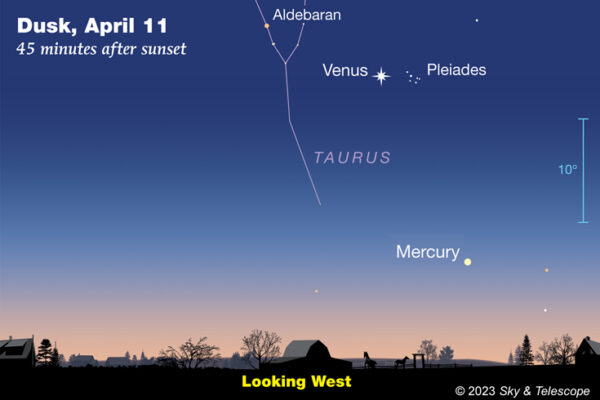
As April opens, you’ll have the chance to see not one but both of the planets that circle the Sun inside Earth’s orbit. Make sure your view toward west doesn’t have trees or buildings to block the view. Look west after the Sun has set, and you’ll easily find dazzling Venus well above the horizon.
Mercury & Venus April 2023
During the first half of April, Mercury makes its best showing in the evening sky for the rest of 2023.
Sky & Telescope
Starting in the second week of April, look below Venus and a bit to the right, down closer to the horizon. As twilight deepens, a rather obvious star will become apparent. That’s Mercury, which is making its best showing of the entire year this month. It gets easier to see as twilight deepens. But this speedy little planet will start to plunge beginning around April 18th, so catch it while you can.
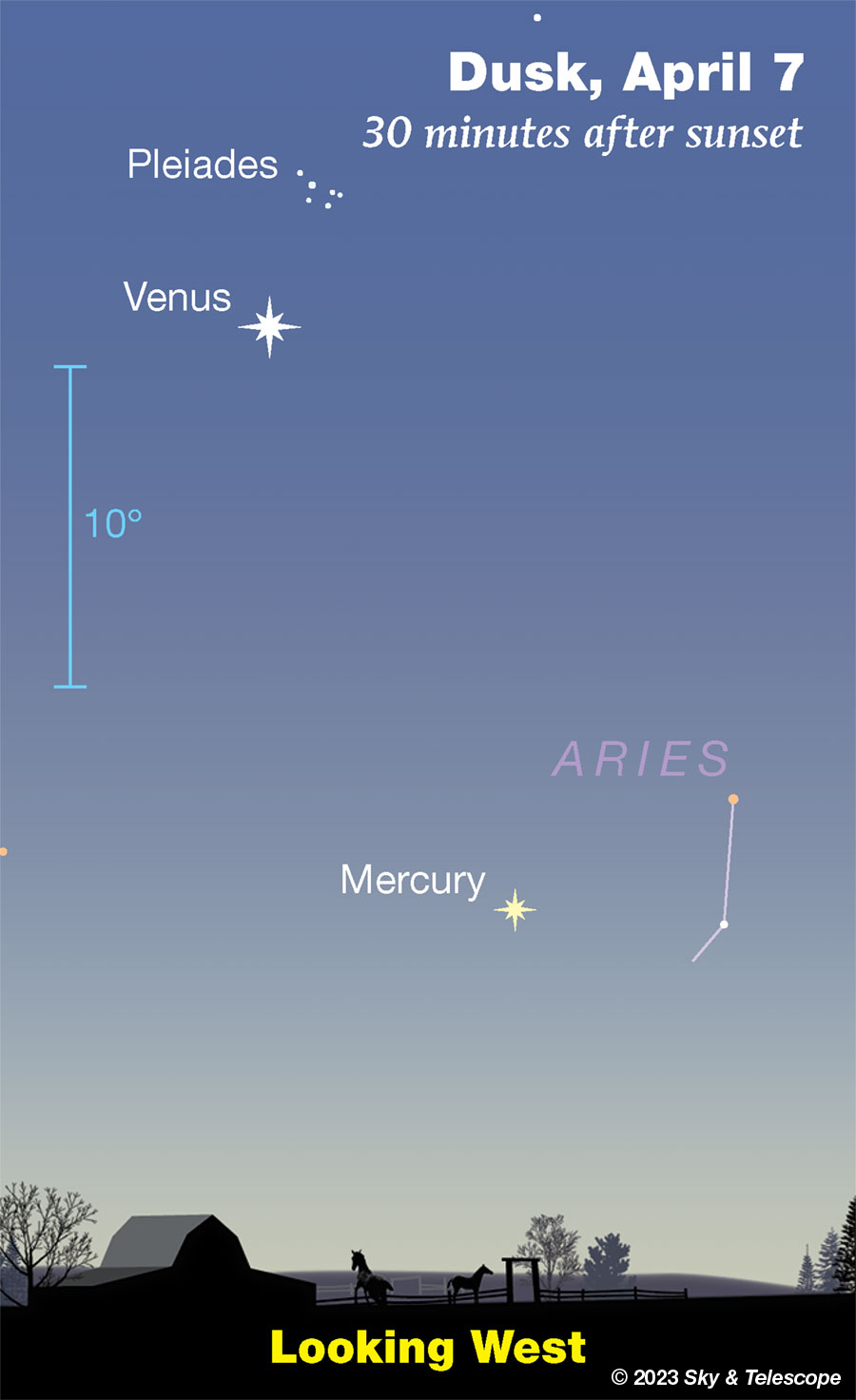
BY: J. KELLY BEATTY APRIL 1, 2023

As April opens, you’ll have the chance to see not one but both of the planets that circle the Sun inside Earth’s orbit. Make sure your view toward west doesn’t have trees or buildings to block the view. Look west after the Sun has set, and you’ll easily find dazzling Venus well above the horizon.
Mercury & Venus April 2023
During the first half of April, Mercury makes its best showing in the evening sky for the rest of 2023.
Sky & Telescope
Starting in the second week of April, look below Venus and a bit to the right, down closer to the horizon. As twilight deepens, a rather obvious star will become apparent. That’s Mercury, which is making its best showing of the entire year this month. It gets easier to see as twilight deepens. But this speedy little planet will start to plunge beginning around April 18th, so catch it while you can.

JP4Fun


- jusplay4fun
- Posts: 8356
- Joined: Sun Jun 16, 2013 8:21 pm
- Gender: Male
- Location: Virginia
Re: Astronomy
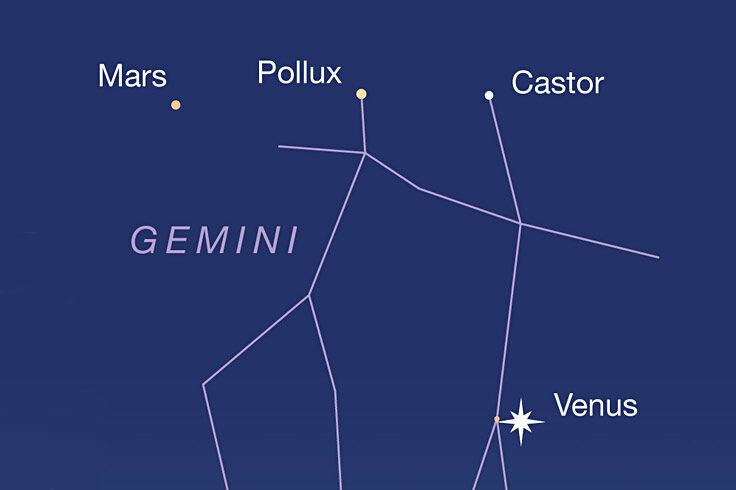
Mars this evening almost lines up with Castor and Pollux in the west. Their exact lineup day is tomorrow the 16th.
Venus, currently stealing the show below them, tonight shines next to 3rd-magnitude Epsilon Geminorum — like Mars did back on April 14th (remember?).
Venus will take Mars's place on the Castor-Pollux line on June 1st.
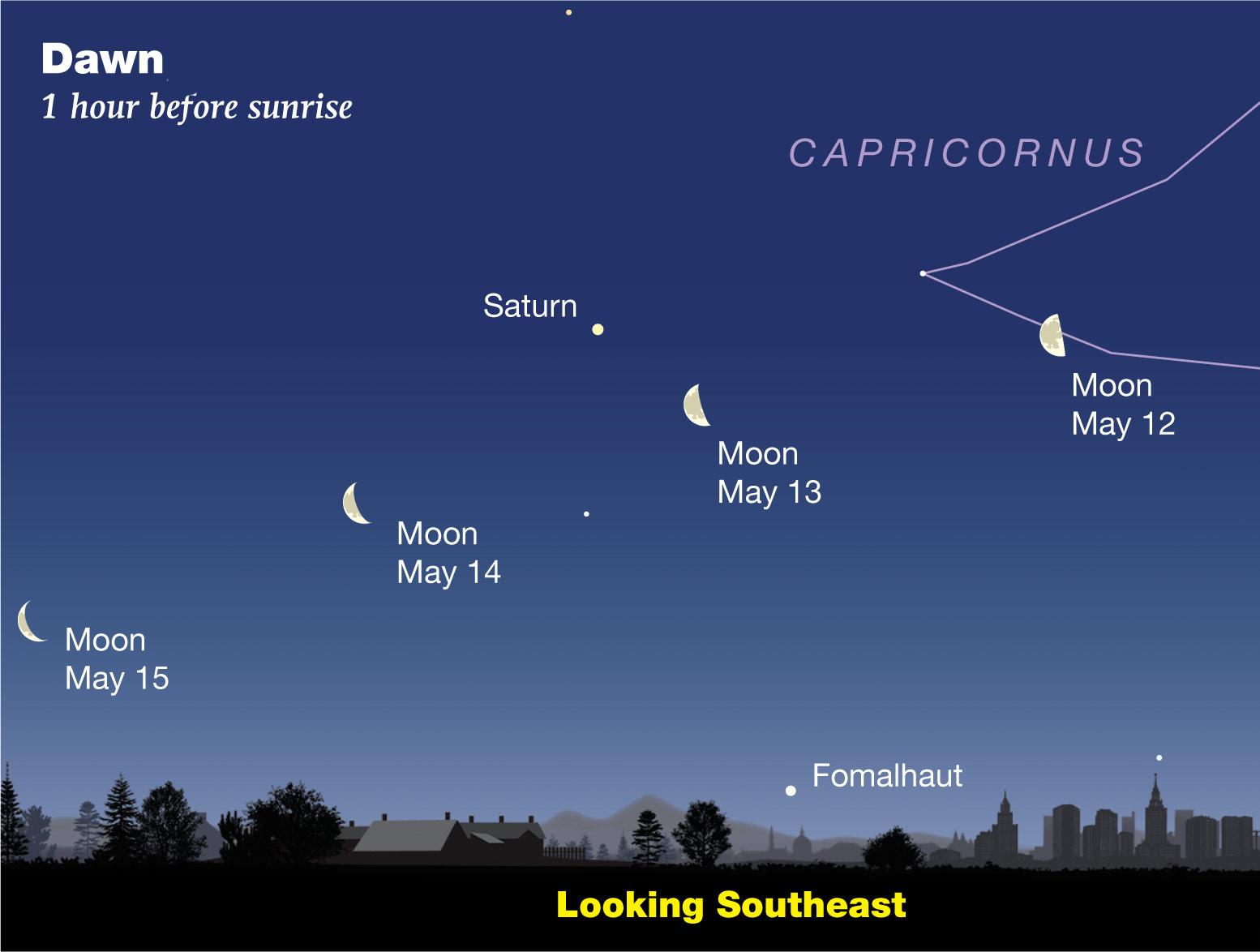
https://skyandtelescope.org/astronomy-n ... may-12-21/The waning Moon helps identify Saturn in the early dawns of May 12 - 15.
JP4Fun



